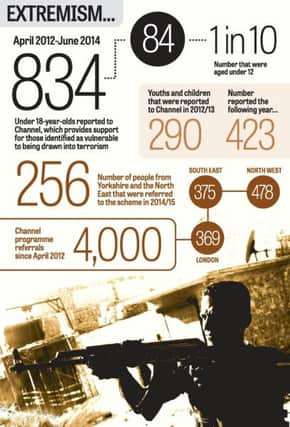One child a day referred to anti-radicalisation scheme


Statistics released by the National Police Chiefs Council (NPCC) showed that between April 2012 and June 2014 a total of 834 under 18-year-olds were reported to Channel, which provides support for those identified as vulnerable to being drawn into terrorism. Around one in ten - 84 - were under 12.
The figures indicate numbers are increasing with 290 youths referred in 2012/13, compared with 423 in 2013/14, a rise of almost 50 per cent.
Advertisement
Hide AdAdvertisement
Hide AdIn the three months from April last year 121 under 18s were referred. If that rate continued throughout the year, it would result in an annual total of 484.
Overall, 2,335 individuals across all age groups have been earmarked for possible intervention by the scheme in two and a quarter years. The Home Office said that since the Channel programme was rolled out nationally in April 2012 there have been more than 4,000 referrals and confirmed the number has increased since last year.
The highest number of referrals during the period were made in the North West, with 478, followed by the South East (375) and London (369). There were 305 referrals in the North East – the region covering the four Yorkshire forces, plus Cleveland, Northumbria and Durham.
Referrals could be made by a range of organisations such as schools, social services and health bodies. The NPCC has previously said many of the referrals of youngsters will not have been suitable for Channel and will have been passed to other more appropriate services.
Advertisement
Hide AdAdvertisement
Hide AdOverall around one in five cases require “supportive interventions”, the organisation said.Channel, first piloted in 2007, is part of the Prevent strategy.
Prevent is one of four strands of Contest, the acronym given to the Government’s counter-terrorism programme.
Government guidance says Channel “may be appropriate for anyone who is vulnerable to being drawn into any form of terrorism” and is “about ensuring that vulnerable children and adults of any faith, ethnicity or background receive support before their vulnerabilities are exploited by those that would want them to embrace terrorism”.
Earlier this year, Dal Babu, a Muslim former chief superintendent, said the Prevent strategy had become a “toxic brand”.
Advertisement
Hide AdAdvertisement
Hide AdMizanur Rahman, who was sent on a programme aimed at turning him away from extreme views, claimed he spent most of his time playing pool.
It also emerged that Brusthom Ziamani, who was jailed for 22 years for hatching a plot to behead a British soldier, had been spoken to by Prevent officers while on bail but refused to engage with the programme.
Under laws passed earlier this year, public bodies including councils, prisons, NHS trusts and schools have a statutory duty to identify and report those vulnerable to radicalisation.
Security Minister John Hayes said: “As a country, we have a duty to challenge, at every turn, the twisted narrative that has corrupted some of our vulnerable young people.
Advertisement
Hide AdAdvertisement
Hide Ad“Referrals to Channel have increased since 2014 but we have dedicated sufficient resources to the programme to cope with demand. We will keep this position under close review.”
Hannah Stuart, research fellow at the Henry Jackson Society think-tank, said the rise in referrals was “in part because of the growing appeal and clever marketing of jihadist ideas among young people by groups like Islamic State.”
The Yorkshire Post has previously revealed that 256 people in the region were referred to Channel in the last full financial year, 2014/15.
Yorkshire has been in the spotlight after it emerged, last month, that Talha Asmal, 17, from Dewsbury, had become Britain’s youngest ever suicide bomber after blowing himself up in Iraq.
Advertisement
Hide AdAdvertisement
Hide AdDays later, it was revealed 12 members of the Dawood family from Bradford, including nine children, had travelled to Syria.
The 256 total is from Yorkshire’s four police force areas and Northumbria, Cleveland and Durham, covered by the North East Counter Terrorism Unit.